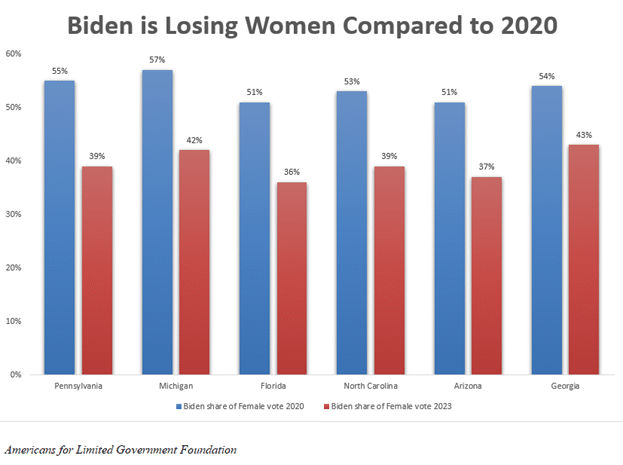November 1, 2023
Permission to republish original opeds and cartoons granted.
House to defund Biden ESG regulations and investments in federal employee retirement plan, end SEC Climate Disclosure Rule

By Robert Romano
Provisions in two upcoming appropriations bills would defund Labor Department regulations allowing employer-based retirement investments into Environmental, Social and Governance (ESG) funds, prohibit federal employee retirement investments by the $800 billion Thrift Savings Plan into ESG funds and would defund implementation of the Securities and Exchange Commission’s Climate Disclosure Rule.
With a little more than two weeks left to go until a Nov. 17 funding deadline, the U.S. House is continuing to consider a flood of appropriations bills, including the Labor, Health and Human Services and Education funding bill, which addresses the Labor Department rules, and the Financial Services and General Government funding bill, which addresses the Thrift Savings Plan and Climate Disclosure Rule.
Republicans’ brand-new policy riders attack so-called “woke” investments that seek to address climate change, social justice and equity via caps on carbon emissions and racial and gender hiring quotas (dubious under a textual reading of Title VII of the Civil Rights Act) by concentrating capital investments into certain companies that meet the ideological goals of being green and implementing diversity and inclusion human resources policies.
ESG investments in the U.S. have grown to $8.4 trillion in 2022, according to the latest data by the USSIF, The Forum for Sustainable and Responsible Investment.
A 2020 regulation by the Trump Labor Department watered down a regulation by the Barack Obama Labor Department in 2015 allowing ESG investments into tax-deferred, employer-based retirement savings accounts like the $6.3 trillion 401(k) market and other defined benefit and defined contribution plans totaling $11.9 trillion.
The 2020 effort mirrored a 2008 regulation by the George W. Bush Labor Department, but was promptly overturned via a May 2021 executive order by President Joe Biden defining climate change a financial risk under ERISA and affirmed later via a 2022 regulation by the Biden Labor Department. And the 2008 regulation was a revision of a 1994 regulation by the Bill Clinton Labor Department, which in turn were revisions to the rules made by prior administrations.
All of these rules are based on the fiduciary duties and obligations defined under federal law in 29 U.S.C. Section 1104, which states, “a fiduciary shall discharge his duties with respect to a plan solely in the interest of the participants and beneficiaries and… for the exclusive purpose of … providing benefits to participants and their beneficiaries; and … defraying reasonable expenses of administering the plan; … with the care, skill, prudence, and diligence under the circumstances then prevailing that a prudent man acting in a like capacity and familiar with such matters would use in the conduct of an enterprise of a like character and with like aims; … by diversifying the investments of the plan so as to minimize the risk of large losses, unless under the circumstances it is clearly prudent not to do so; and … in accordance with the documents and instruments governing the plan insofar as such documents and instruments are consistent with the provisions of this subchapter and subchapter III.”
So far, Republican administration attempts to hold back ESG had depended on fiduciary rules, that state as long as investments remain profitable commensurate with other non-ESG investments, then environmental, social and other factors may be taken into consideration when making economically targeted investments.
In this case, Congressional intervention appears to up the GOP’s ante on the issue, instead seeking outright prohibitions on these investments, including on investments into the aforementioned $800 billion federal Thrift Savings Plan that President Biden greenlighted in 2022 via the Financial Services appropriations rider.
It is a limited approach. The Labor Department rule only touches employer-based defined benefit and defined contribution plans, which total about $11.9 trillion currently, but only make up 36.8 percent of the $32.3 trillion retirement savings market nationwide.
These Congressional defunds, for example, do not necessarily impact the $11.7 trillion Individual Retirement Accounts (IRAs) market or the $10 trillion in state and local government retirement investments, including state government employee retirement funds in California, New York, Colorado, Connecticut, Maine, Maryland and Oregon.
But this is still by far the most aggressive approach Republicans have ever considered legislatively to take on ESG. The fact that the policy riders came out of the appropriations committee shows that GOP leadership has embraced this policy approach, which increases the odds they can find their way into the final legislation between the House and Senate.
The legislation would also prohibit the Securities and Exchange Commission (SEC) from completing and implementing its Climate Disclosure Rule that implements ESG-based carbon emissions disclosures into securities regulations. The rule seeks to address supposed “greenwashing” by corporations when making climate sustainability claims, with the SEC determining which corporations are eligible for inclusion in ESG funds and the additional, weighted capital infusions that come with it being directed by massive hedge funds with trillions of dollars under management like Vanguard and Blackrock, which then vote the shares of their clients in corporate elections.
A recent KPMG survey finding 82 percent of U.S. corporations are touting ESG sustainability goals in their corporate filings, creating a ripe target for the SEC. Ironically, virtue signaling with the sustainability claims by no means guarantees weighted inclusion in hedge funds’ ESG funds like BlackRock, Vanguard, etc. Now, the SEC wants to pick winners and losers in ESG, punishing firms that fail to reduce carbon emissions.
The impact of ESG has not been lost on Republican state attorneys general. In 2022, former Arizona Attorney General Mark Brnovich and former Nebraska Attorney General Doug Peterson and 17 other Republican Attorneys General that threatened the $10 trillion hedge fund BlackRock with antitrust legal action.
In an Aug. 4, 2022 letter to BlackRock CEO Larry Fink accusing the company of “intentionally restrain[ing] and harm[ing] the competitiveness of the energy markets” with its market dominance of retirement investments.
Brnovich and Peterson added, “coordinated conduct with other financial institutions to impose net-zero [carbon emissions by 2050] … raises antitrust concerns. Group boycotts, restraining trade, or concerted refusals to deal, ‘clearly run afoul of’ Section 1 of the Sherman Act [according to the Supreme Court]. Section 1 prohibits ‘[e]very … combination … , or conspiracy, in restraint of trade or commerce.’ Regarding the definition of a ‘combination,’ the Supreme Court has held that this language prohibits ‘concerted action.’”
In a similar vein, America First Legal and other conservative organizations have begun filing Title VII civil rights complaints against companies that have adopted ESG’s racial and gender based hiring quotas.
These are very important developments. Until recently, the current expectation had been that the "invisible hand" of the market should provide the correction needed in the culture war and against the green cartel. While some commentators have sought to proclaim that woke is over, pointing to recent stock market volatility, I fear it's not enough, and that the incentives that have been put into place, whether to go green or do diversity, equity and inclusion, are truly what need to be addressed.
Now, with Congress weighing in, Republicans appear to be making this issue a top priority, using its Congress’ constitutional, Article I power of the purse to take down the government-based incentives and subsidies that in part have fueled ESG. If woke is over, why are House Republicans still fighting against it?
Robert Romano is the Vice President of Public Policy at Americans for Limited Government.
Video: House To Support Israel With $14.3 Billion Military Assistance

To view online: https://www.youtube.com/watch?v=ljzefiKSzOw
Women in Swing States Like Florida, Michigan and Pennsylvania Could be the Biggest Thorn in Biden’s Side New Polling Data Warns

By Manzanita Miller
President Biden continues to trail across the country singing the virtues of “Bidenomics”, but voters aren’t buying it – especially female voters in highly contested battleground states that will play an outsized role in 2024.
Biden won women by a wide fifteen-percentage-point margin in 2020, but new polling shows he is suffering double-digit losses with women across key battleground states, and the economy, rising crime, inaction on the border, and foreign policy all play a role.
A late October Morning Consult poll of voters in Arizona, Georgia, Michigan, Nevada, North Carolina, Pennsylvania and Wisconsin shows Trump ahead of Biden by 4 percentage points across the states.
Biden is trailing Trump by several percentage-points in five key states he narrowly won in 2020, indicating several swing states may jump back into the GOP column in the next election. Biden trails Trump by five points in Georgia and by four points in Arizona, both of which he won in 2020. He trails Trump by three points in Nevada and by two points in Wisconsin, both of which he won in 2020. Biden also trails Trump by one point in Pennsylvania which he won in 2020 as well.
Biden is also trailing Trump by four points in North Carolina, a state he lost in 2020. The only swing state where Trump is not ahead of Biden is Michigan, where the two are running evenly.
The largest contributor to Biden’s reversal of support in swing states is the economy, with voters across the swing states saying “Bidenomics” is bad for the economy by a two-to-one margin, 49% to 26%.
Biden appears to be on the brink of losing well over a tenth of voters in swing states who backed him in the 2020 election, with 14% of voters who supported him in 2020 saying they won’t back Biden in the next election.
Who might be in that coalition of former Biden voters who have had enough and are exiting the Democratic Party in the next election? According to similar swing state polling by Redfield & Wilton, women are likely one of the largest coalitions that are switching allegiance.
Americans for Limited Government already pointed out that Biden is polling at double-digit losses across swing states with Gen Z voters compared to 2020, but Biden is also suffering steep declines with women compared to 2020.
The following chart compiled using Redfield & Wilton polling data shows just how dire Biden’s numbers are with women now compared to 2020 exit polls.

Take a look at Pennsylvania, where Biden won a comfortable 55% of female voters in 2020 to Trump’s 44% but is on track to win just 39% in the next election, a 16-percentage-point decline compared to 2020.
Biden’s prospects do not improve much in Michigan, where he won a wide 57% of female voters in 2020 compared to Trump’s 43%. The latest swing state polling shows Biden on track to win just 42% of female voters next election, a 15-percentage-point decline since 2020.
Biden narrowly won Florida women in 2020 51% to Trump’s 48%, but he is on track to win just 36% of their vote in the next election, another 15-percentage-point decline compared to 2020.
North Carolina shows an equally steep decline in female support for Biden, with Biden winning 53% of female voters in 2020 to Trump’s 46%, but on track to win just 39% next election, a 14- percentage-point decline.
Arizona follows a similar trajectory, where exit polls show Biden won a comfortable 51% of female voters to Trump’s 48% in 2020. Compare that number to where he is polling with women now at just 37%. That is a 14-percentage-point decline compared to 2020.
Georgia shows a slightly smaller decline with Biden winning 54% of female voters in 2020 to Trump’s 45%. The latest polling shows Biden earning just 43% of women, an 11-percentage-point decline compared to 2020.
Women are also more critical of Biden’s performance than men are across a range of hot-button issues. Polling from YouGov shows women are particularly critical of Biden’s handling of the economy, crime, immigration, and national security, giving Biden lower rankings than men do across these issues.
On the economy, just 37% of women compared to 43% of men approve of Biden’s actions, while on crime just 30% of women compared to 36% of men approve. These are both six-percentage-point differences with women hitting Biden harder.
On immigration, another dominant issue, women approve of Biden’s job eight-percentage-points less than men, with just 27% of women compared to 35% of men supporting Biden’s actions.
National security is the issue women show the largest disparity on, with women approving of Biden’s handling of national security matters a full 10-percentage-points less than men. Just 36% of women compared to 46% of men support Biden’s actions on national security.
Women also disproportionately cite inflation and gas prices as very important issues to them, with 80% of women compared to 68% of men indicating inflation and gas process are ‘very important’ according to YouGov.
Democrats trumpeted Biden’s victory with women in 2020, including his ability to win back a greater share of the female vote against Trump than Hillary Clinton was able to secure in 2016, but those voters may swing back the other direction. Economic issues play a central role in women’s dissatisfaction with Biden, but women also give Biden harsh marks on issues like immigration, crime, and foreign policy that will play outsized roles in the next election.
Manzanita Miller is an associate analyst at Americans for Limited Government Foundation.

House Israel Support Bill Gets it Exactly Right
Oct. 31, 2023, Fairfax, Va.—Americans for Limited Government President Rick Manning today issued the following statement in support of the House’s $14.3 billion Israel aid legislation that also slashes IRS enforcement funds:
"Americans for Limited Government urges the House to pass their $14.3 billion Israel military support appropriations bill immediately. This legislation focuses exclusively on Israel's military needs as the threat of a three front war looms for our Middle Eastern ally.
"New Speaker Michael Johnson has kept his promise by narrowing this aid package to only include money for military needs, stripping out President Biden's requests for so-called humanitarian aid for Hamas and the Palestinian Authority. The bill offsets the proposed spending by rescinding funds allocated to the Internal Revenue Service making it budget neutral.
"The separation of the Israel aid package from the rest of the Biden request will lead to a separate debate about Ukraine, the border, humanitarian aid and a request from the Navy to increase the submarine fleet in the Pacific Ocean. The Senate is expected to consider Biden's full $105 billion aid request without financial offsets.
"The House's legislation focuses on the important immediate needs, not allowing the urgency resulting from the horrific October 7 attack against civilians by Hamas to be used as an excuse to railroad through other proposals which don't have the same urgency and should have been included in the regular appropriations bills being considered. Americans for Limited Government supports defending our ally Israel with military materiel, and the House's fiscally sound approach meets both America's foreign policy objectives and our domestic need to bring sanity back to our federal government spending."
To view online: https://getliberty.org/2023/10/house-israel-support-bill-gets-it-exactly-right/



